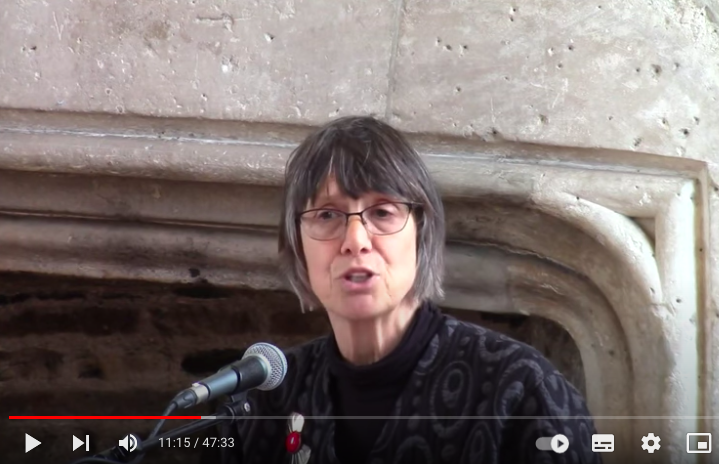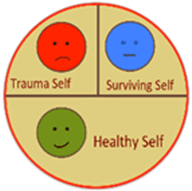|
This paper explores the territory where notions of soul and spirituality meet theories of psychological trauma.
While neuroscience and neuropsychology can tell us some things about the effects of traumatising relationships on the brain, there is much more to be said. I will argue that we are only able to render traumatic experience meaningful through metaphor, imagery and bodily experience. I draw on McGilchrist as well as Hillman’s proposition that ” The Soul is less an object of knowledge but a way of knowing”. I consider, how does relational trauma break the soul? I will argue that a traumatised soul renders us to be lost wanderers in life. Amongst other things, I will look at how these questions play out in the multigenerational transmission of trauma. I will also make reference to the value of the constellations approach in accessing pre-verbal and bodily held memory, and to the healing integration process.
0 Comments
I have become aware of how often I refer to ‘parts’ of our selves when working with coaches in supervision and with clients and how it is always met with ‘that is so helpful’. I thought I would share this approach and my thinking more widely. Examples include:
The first statements imply the experience is all encompassing and suggests an identification with the feeling or narrative. Such identifications come from the survival self. It is not true that ‘all of us’ is caught up in this experience, we have access to other resources which can reflect on and engage with the context we are responding to. In trauma the ‘psyche’ splits, creating the survival and traumatised selves. The healthy self continues but access to it has been diminished by the trauma (see previous postings). This figure (© Franz Ruppert), illustrates that split. Due to the fragmentation that occurs with trauma, within each of the survival and trauma selves there are different ‘parts’, different expressions of the survival self and strategies, or the trauma self. Each ‘part’ carries memories, beliefs and feelings which connect to the ‘there and then’. By talking of ‘part of you/me’ we recognise that this part exists, and leaves the possibility open of other parts emerging from the healthy self as resources to be accessed. The healthy parts are more consistent as they are unaffected by the trauma, other than being repressed by the survival self. From that self we know what is healthy for us, can think clearly about what is our business and what is the business of others, and what action is in our best interests. In coaching, we want to encourage the healthy parts to have a voice, to challenge the survival part narrative.
Whenever you hear yourself make statements which sound all encompassing, change your language to ‘part of me feels’. Encourage those you supervise or coach to experiment with that as well. It is a simple way of reframing and recognising the splits in the psyche. It is important also to welcome all parts, while we are reframing to ‘part of you feels overwhelmed’ we need to make it clear that that part is welcome, it is not being rejected. This is because many people dislike or want to reject the parts that are present, particularly those from the trauma self, but also those from the survival self. All parts are important in terms of understanding the internal system. We can ask the client to say more about a part, and explore what other parts are also present. A client the other day arrived saying “part of me is fine, the other part of me is wobbly”, my response was both parts are welcome. That allows both to be present. In his book Internal Family Systems Therapy, Richard Schwartz takes this to a further stage by identifying and naming parts as sub-personalities within the internal psyche-system of the individual. He talks of trauma causing the self-system to break down, with parts of the self becoming polarised and at war with each other. I read this as being similar to Franz Ruppert’s approach with the splits in the psyche and the fragmented selves. Schwartz identifies three categories – Exiles, Managers and Firefighters. Within Ruppert’s model, Exiles are trauma parts, with Managers and Firefighters being survival parts. Schwartz also talks of the undamaged essence-self, in Ruppert’s terms the healthy self, that is confident and can emerge to lead the healing process. He refers to this as self-leadership. The parts that emerge, he states, may not be aware of other parts of the system, hence the naming of them and allowing for other parts to emerge. While he is writing for therapists, if coaches are interested, there is much that can be transferred appropriately and usefully within coaching practice. Julia Vaughan Smith “I was rather taken aback, the client talked a lot about her current relationship difficulties and seemed to want to focus on that, is that coaching? It felt more like counselling”.
The implied question seems to be that if this is the content, is that still coaching? For me, the answer is yes. I also heard some concern in her voice about what to do with this material, how to receive it and respond. This illustrates one of those experiences that we have all had in our coaching lives, when something happens which leaves us feeling unprepared, and which is a rich opportunity for learning. Clients may choose to share deeply personal information with us within the safety of the confidential space. We need to receive it and stay listening as they talk. It is what we do with the material, that makes it coaching, counselling or therapy; together with the extent to which the contract involves exploring feelings and inner experience. A coaching response would be to acknowledge the feelings, and then make an intervention that is aimed at the client’s healthy resources and implies moving towards action. For example, with questions similar to ‘what would be helpful for you here about this issue?’ or ‘ what would be a good outcome for you?’ . It may be that clients need some space to decide what action they want to take, perhaps to find a counsellor to explore the issue in a different way. If the contract is about work-based coaching, supporting clients to decide what action to take, can be beneficial to their work and thus to their employers and colleagues. Many relationship difficulties arise from entanglements resulting from insecure attachment and the trauma of love in early years. While understanding these dynamics wouldn’t change an effective coaching response it does prevent and ineffective or inappropriate one. I am aware that some coaches are concerned about learning about trauma in case that takes them into territories for which they feel unprepared and untrained. Such cautions are important in practice. However, my experience is that understanding trauma means that you are less likely to get into territory for which you feel unprepared. If we understand trauma, we are better able to recognise survival behaviour, thoughts and feelings, and are less likely to become entangled with the story or to rescue or reject the client. Julia Vaughan Smith |
News blogArchives
May 2024
Access Octomono Masonry Settings
|



